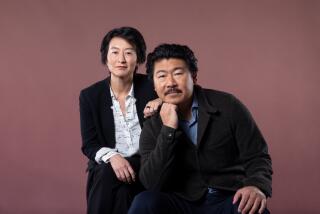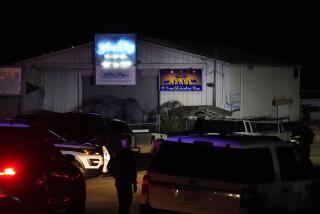Slaughterhouse owners accuse Rosemead officials of discrimination
Something reeks in Rosemead.
Some say it’s the slaughterhouse on Garvey Avenue. Others say it’s a bigoted attitude toward the company’s Asian clientele that stinks.
For two decades, Chinese American Live Poultry has sold freshly killed birds you can grab by the feet and look in the eye. Located on an industrial corridor where the traffic is thick and the strip malls are tired, the storefront serves hundreds of customers a day.
But city officials have voted to shut down the business, citing offensive odors, traffic congestion and escaped chickens. Slaughterhouses, they say, have no place in a city that brands itself as “Today’s Small Town America.”
Owners Quan and Dana Phu have filed a suit in federal court, accusing city officials of racial and religious discrimination. Closing their shop deprives the community of an essential service, they argued. Fresh poultry with the head and feet intact holds special meaning for many Asians, who use the whole birds for family meals, and Buddhists, who use them as offerings to ancestors when praying, the lawsuit says.
The dispute highlights one San Gabriel Valley city’s struggle to reconcile its vision of the future with a dramatic ethnic shift. In the last decade, an influx of Chinese and Vietnamese immigrants has made the middle-class bedroom community of 54,000 more than 60% Asian. Yet many of these new residents are unable or unwilling to vote, and few participate in Rosemead’s civic affairs. The result, some say, is a city government that responds to the concerns of a minority of its residents and ignores the rest.
“They don’t care about our kind of business or our culture,” said Quan Phu, who is ethnically Chinese but was born in Vietnam.
City officials deny the contentions of discrimination and say Rosemead takes pride in its diversity. Its City Council includes one white member, two Asians and two Latinos.
This poultry flap isn’t the first time Rosemead has experienced difficulty coming to terms with changing demographics. In the 1980s, when Asians were trickling into a predominantly white and Latino city, officials outlawed business signs written entirely in a foreign language.
More recently, the city was sued by the Department of Justice in 2005 for not providing voter information in Chinese, Vietnamese and Spanish as required by federal law. It wasn’t until 2008 that the city offered its newsletter in a language other than English. The same year, a council member proposed a law that would require city recreation classes — some of which are geared toward Chinese speakers — be conducted in or translated into English.
Much of the tension arises from the fact that 35% of Rosemead’s Asian residents are not naturalized and cannot vote. Many come from countries where it’s unheard of to speak up to the government. Thus, the city’s majority is often drowned out by a smaller but louder voting bloc, they say.
“The power structure right now in the city is run by people who have lived here for 30, 40, 50 years,” said Bob Bruesch, who was mayor when the slaughterhouse opened in 1991.
“This is a cultural clash. I’m not saying that in a negative sense. It’s the stuff communities face when there is an ethnic change. Almost like the problems they had when Jewish people started moving into Boyle Heights and they had to have kosher meat, which has to be bled. They had a lot of outcry. You have to balance it out between the needs of the local businesses and the needs of the local populace.”
The problem with Chinese American Live Poultry, officials say, lies in an ordinance that banished slaughterhouses shortly after the business opened. It was grandfathered in but barred from making any changes.
Although the Phus want to renovate the slaughterhouse to address the issue of odors, allowing them to upgrade would mean changing the ordinance, paving the way for other slaughterhouses in the area, officials say.
“Who wants a slaughterhouse in their backyard?” said current Mayor Sandra Armenta. “We are trying to be very business-friendly, but we have to look at all aspects.”
A working-class city where auto repair shops and mom-and-pop storefronts dot the main thoroughfares, Rosemead recently launched an enthusiastic campaign of landscape makeovers, beautification days and “curb appeal” awards in an effort to attract new businesses.
“We want the big-name restaurants, we want major grocery stores. Right now the only market we have is Fresh & Easy, and the other ones are more ethnic,” Armenta said. “We used to have Ralphs.”
Ralphs closed eight years ago when council members successfully pushed to bring a Wal-Mart Supercenter to town. The Ralphs was replaced by an Asian supermarket.
Meanwhile, the Phus — who recently won a preliminary injunction that allows them to stay open during litigation — say their business has thrived. Their nearest competition is in downtown Los Angeles’ Chinatown and in Whittier, which has a tiny operation.
“This is the only place we’ve ever gone,” said resident Ung Ho, 28, who emigrated from Vietnam. Ho picks up chickens for his parents and grandparents several times a month. “Our family considers a fresh chicken one you slaughter and cook right away, head and everything.”
In the past, the city had been willing to work with the Phus, approving a request to build an adjacent retail store and modify an outdoor loading and storage area to enclose operations and reduce odor.
But then things changed. Councilwoman Margaret Clark — who envisions Garvey Avenue as “a beautiful boulevard where people can shop” — campaigned in part on a pledge to shut down the slaughterhouse, and a new board said it was time to listen to neighbors who complained of traffic jams and a stench that was compared to rotting rats. The slaughterhouse had also been written up for washing chicken waste down a storm drain and unauthorized signage.
However, the Rosemead slaughterhouse stands out as one of the cleanest of the two dozen in Los Angeles County, according to a supervisor with the California Department of Food and Agriculture.
“I have never seen people gang up like they have on this business; and he is not a bad operator, he is one of my best,” Namara Garbaba said.
Resident Joyce Limones, 53, said she has little sympathy for the Phus’ plight.
“We all went through it,” Limones said. “I’m American Indian, this is my country and do you see me crying? We were here first but we’re adapting. So they need to learn to adapt to our world.”
George Beltran, who owns the auto shop next to the slaughterhouse, said he’s not so sure the street needs a makeover.
“It’s a commercial area,” he shrugged. “Everybody’s trying to make it, we’re all trying to work. Different cultures have different tastes and ways of doing things. And most of the people here are Asian anyway.”
More to Read
Sign up for Essential California
The most important California stories and recommendations in your inbox every morning.
You may occasionally receive promotional content from the Los Angeles Times.







